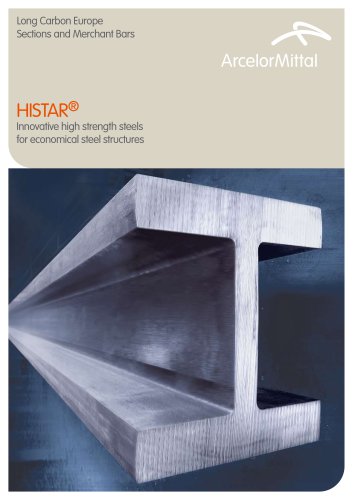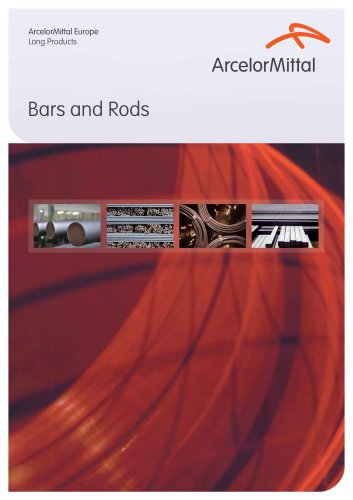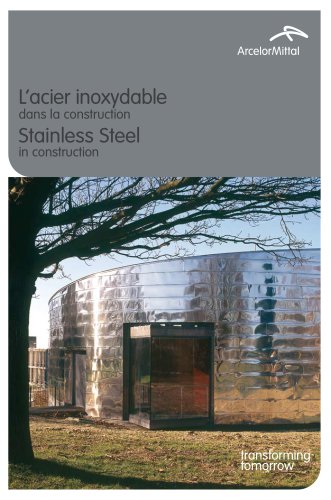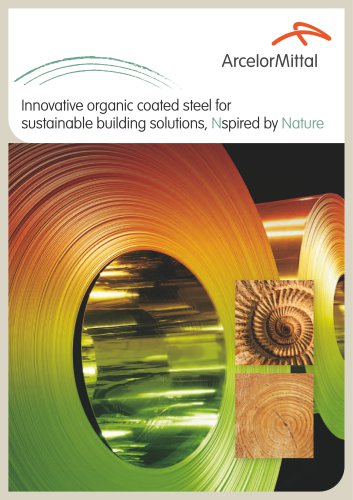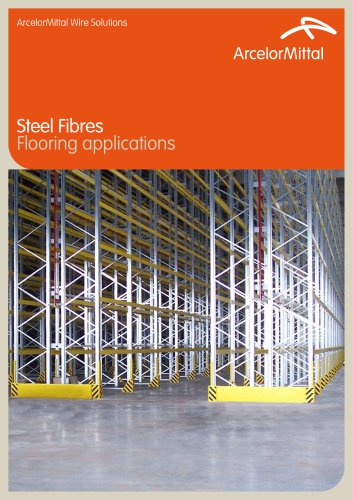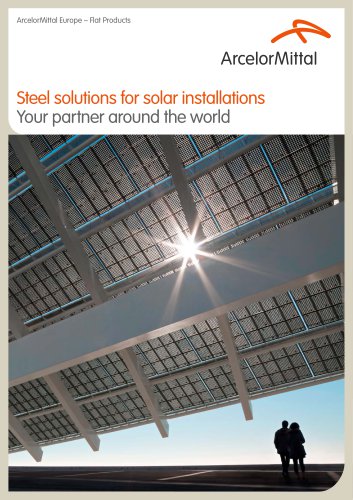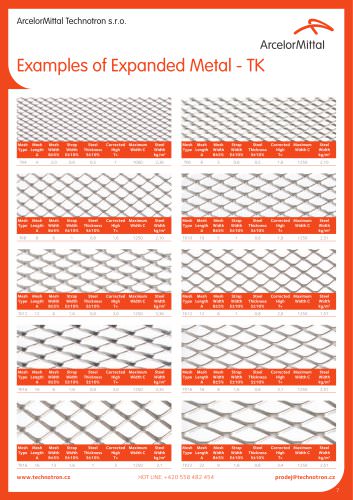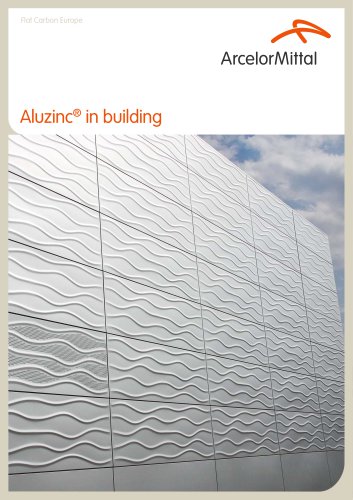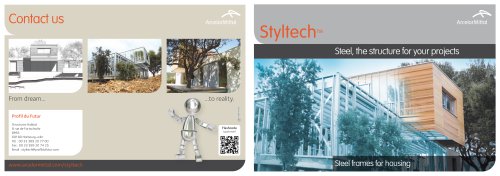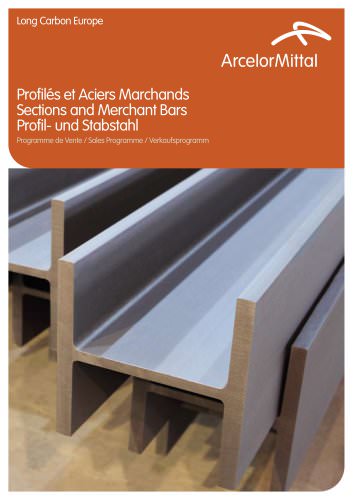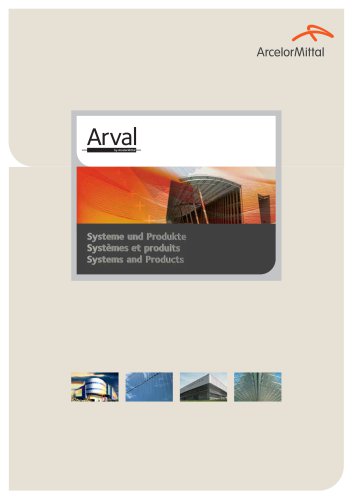
Excertos do catálogo

Long Carbon Europe Sections and Merchant Bars Innovative high strength steels for economical steel structures
Abrir o catálogo na página 1
Shanghai World Finance Center, P.R. China Innovative high strength steels for economical steel structures
Abrir o catálogo na página 2
Hot rolled sections in sustainable construction 2. Characteristics of the HISTAR® steels 3. Weight reduction of steel structures through the use of HISTAR® steels 5. Technical delivery conditions Technical Advisory & Finishing Your partners
Abrir o catálogo na página 3
Hot rolled sections in sustainable construction The preservation of natural resources in our industrialized societies has become a priority in the creation of the built environment. Consequently, the industrialized building concepts have to comply on one hand with changing economical parameters like the incorporation of life cycle analyses in the design of buildings, on the other hand with technological changes for considering at an equal level sustainability goals with respect to the environment, economy and society. building material in the world. In the modern safety. The inhabitants and...
Abrir o catálogo na página 5
© Chuck Choi - Architect: Foster & Partners - Hearst Tower, NYC
Abrir o catálogo na página 6
1. Introduction © Skidmore, Owings & Merrill LLP / dbox Studio With the development of the HISTAR steels, ArcelorMittal has succeeded to create structural steels combining high yield strength with excellent toughness at low temperatures and outstanding weldability. These material properties were considered incompatible until now. This development was made possible by the innovative “in line” Quenching and SelfTempering (QST) process, developed by the Commercial Sections division of ArcelorMittal in cooperation with the Centre de Recherches Métallurgiques in Liège. The QST process enables...
Abrir o catálogo na página 7
2. Characteristics of the HISTAR® steels 1. Product Description Different HISTAR grades are available in the market: HISTAR steels are structural grades with a low alloy content, combining high strength, good toughness and superior weldability. HISTAR grades are available with minimum yield strengths of 355 or 460 MPa. HISTAR steels are delivered in the thermomechanically rolled condition and comply with the requirements of the European standards EN 10025-4:2004 for weldable fine grain structural steels and EN 10225:2001 for weldable structural steels for fixed offshore structures. They...
Abrir o catálogo na página 8
Table 1: Comparison table for HISTAR grades Standards HISTAR Yield strength (MPa) European and national standards Previous standards 2. Chemical composition and mechanical properties The chemical composition and the mechanical properties of the HISTAR grades are given in Table 2 and 3 for general construction and in Table 4 and 5 for offshore applications. (pages 8-9) 3. Types of sections HISTAR grades are available for HE-beams ≥ 260 mm and IPE beams ≥ 500 mm. The corresponding ASTM A6 and the BS 4 shapes are also available. The maximum flange thickness is: 125 mm for HISTAR 355 / 460 63...
Abrir o catálogo na página 9
2. Characteristics of the HISTAR® Steels Table 2: Chemical composition of HISTAR steel grades for general applications Chemical composition Ladle analysis [%] Grades (1) CEV = C + Mn/6 + (Cr + Mo + V)/5 + (Cu + Ni)/15 (2) If sufficient nitrogen binding elements are present, the minimum aluminium requirement does not apply. (3) Upon agreement: Si = 0.14 - 0.25 % and P ≤ 0.035% max. for capability of forming a zinc layer during hot-dip galvanisation. Table 3: Mechanical properties of HISTAR steel grades for general applications Mechanical properties Charpy V-notch impact test (1) Tensile test...
Abrir o catálogo na página 10
2. Characteristics of the HISTAR® Steels Table 4: Chemical composition of HISTAR steel grades for offshore applications Chemical composition 1) CEV = C + Mn/6 + (Cr + Mo + V)/5 + (Cu + Ni)/15 (2) When other N-binding elements are used, the minimum Al value does not apply. (3) Upon agreement: Si = 0.14 - 0.25 % and P ≤ 0.035% max. for capability of forming a zinc layer during hot-dip galvanisation. Table 5: Mechanical properties of HISTAR steel grades for offshore applications Mechanical properties Through thickness tensile test (1) Tensile test Charpy V-notch impact test (2) Longitudinal...
Abrir o catálogo na página 11
3. Weight reduction of steel structures through the use of HISTAR® steels
Abrir o catálogo na página 12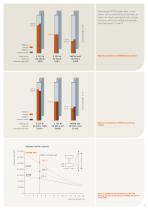
High strength HISTAR grades allow, in comparison with conventional structural steels, to reduce the weight and material costs of steel structures, and to cut welding and assembly time (see Figures 2,3 and 4). Relative weight Relative material costs S 235 JR HE 280 M 4578 Steel grade Section Ultimate load (kN) Figure 2: Economical use of HISTAR steel in columns 100 % 70 % 68 % Relative weight Relative material costs S 235 JR HD 400 x 1086 25254 Steel grade Section Ultimate load (kN) Figure 3: Economical use of HISTAR steel in heavy columns HISTAR 460 Relative ultimate load Ultimate load for...
Abrir o catálogo na página 13
ArcelorMittal Photo Library - Architect: Dominique Perrault - Velodrome, Berlin
Abrir o catálogo na página 14
Fabrication costs Weight per meter 120 % 102 % Steel grade Section Ultimate load (kN) Weight (kg/m) Due to the high yield strength of HISTAR beams, it is possible to substitute complicated and expensive built-up sections by economical hot rolled beams (see Figure 5). Figure 5: Economical use of a HISTAR column compared to built-up sections In case of bending, the required cross section and fabrication cost can be reduced by using beams in HISTAR grades (see Figure 6). Weight relative to grade S 355 Material costs Weld volume 125 % 112 % 110 % 7m Steel grade Section Ultimate load (kN) HISTAR...
Abrir o catálogo na página 15
4. Fabrication guidelines 1. General The general recommendations given in this chapter shall be observed to ensure the successful fabrication, welding, and heat treatment of the fine-grained high-strength HISTAR 355 and HISTAR 460 steels for structural and offshore applications. HISTAR steels offer a good weldability for manual and automatic processes, provided the general rules for welding are respected. Shielded Metal Arc Welding (SMAW), Gas Metal Arc Welding (GMAW), Flux-Cored Arc Welding (FCAW), and Submerged Arc Welding (SAW) are processes successfully used to weld HISTAR 355 and 460...
Abrir o catálogo na página 16Todos os catálogos e folhetos técnicos da ARCELORMITTAL Long
-
Long Products
180 Páginas
-
Slim-Floor
40 Páginas
-
ACB® and Angelina® beams
64 Páginas
-
Bridges With rolled sections
52 Páginas
-
Bars and Rods
36 Páginas
-
Stainless steel in construction
68 Páginas
-
Arval Sunstyl
16 Páginas
-
Arval Design Façades - Freedom to Create
72 Páginas
-
Pflaum & Söhne Bausysteme GmbH
72 Páginas
-
Arval Colorissime
10 Páginas
-
Steel Sheet Piling
56 Páginas
-
Beam Finishing
8 Páginas
-
ACB - Cellular Beams
48 Páginas
-
RESIDENTIAL BUILDINGS
68 Páginas
-
Angelina TM beams
38 Páginas
-
Safety Barriers
12 Páginas
-
Steel Solutions for Solar Installations
12 Páginas
-
Pfl aum & Söhne Bausysteme GmbH
72 Páginas
-
Frame Solutions - Built-Up Sections
6 Páginas
-
Examples of Expanded Metal - TK
3 Páginas
-
Aluzinc® in Building
8 Páginas
-
PROTEA® - affordable quality housing
16 Páginas
-
STYLTECH TM - Steel Frames for Housing
14 Páginas
-
Long Steel Products for Renewable Energy
24 Páginas
-
Colorissime
10 Páginas
-
Form Tie Bars
2 Páginas
-
ExpandedMetal
24 Páginas
-
CARRIL / RAIL
28 Páginas
-
AMCRPS
52 Páginas
-
Sections and Merchant Bars
244 Páginas
-
arival system by arcelormittal
80 Páginas
-
ArcelorMittal Piling Handbook
368 Páginas
-
Sunstyl
16 Páginas
Catálogos arquivados
-
Material Selection Guide
23 Páginas
-
Floor systems guide
96 Páginas

